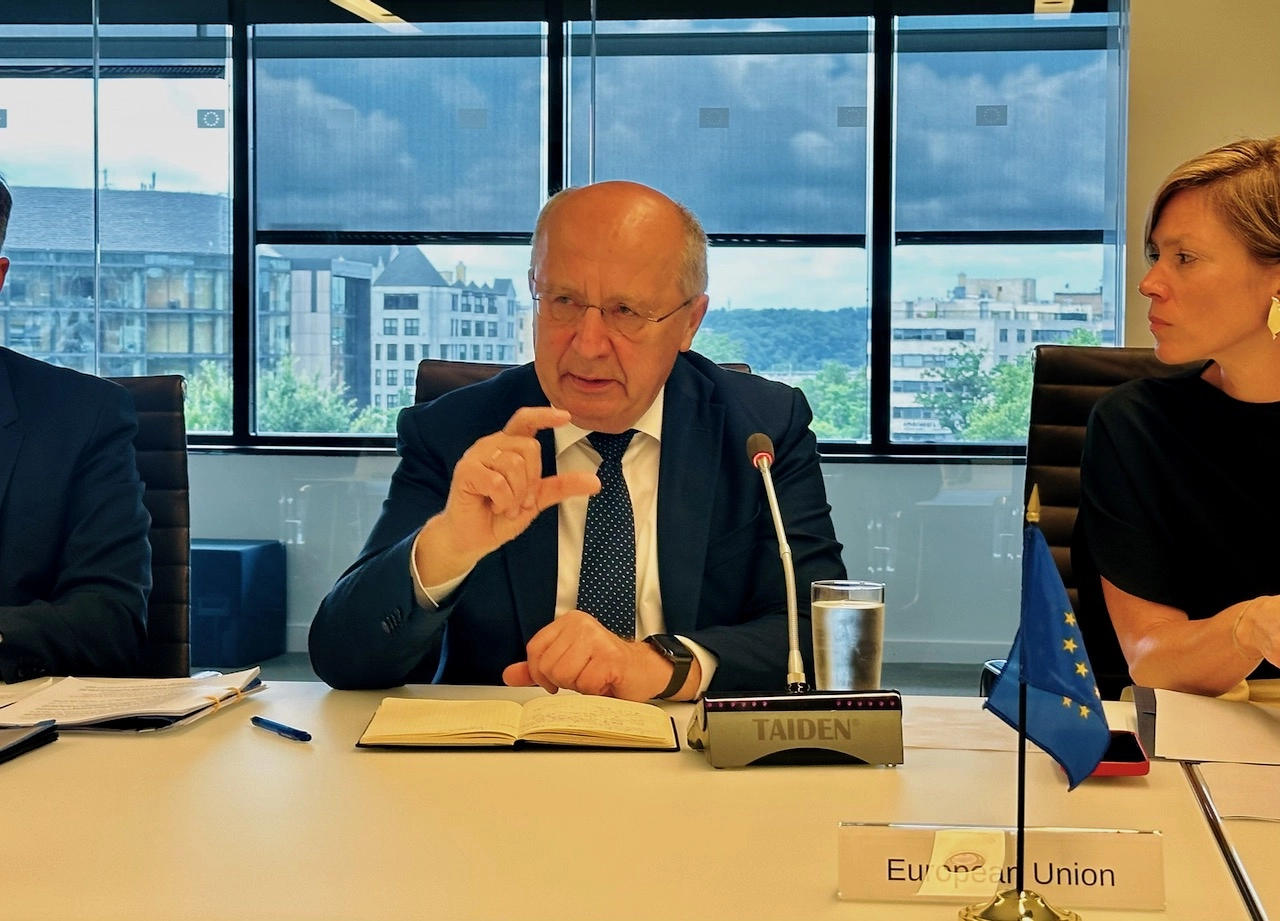EU Commissioner for Defense and Space, Andrius Kubilius: Europe is “stepping up” the 27-member bloc’s responsibility on security amid the Russian threat.
by Alex Raufoglu

WASHINGTON DC – Europe is stepping up to take greater responsibility for its own defense in the face of growing threats, particularly from Russia,
the EU’s first-ever Commissioner for Defense and Space, Andrius Kubilius, stated on Monday.
Speaking at the European Defense Night in Washington, Kubilius highlighted the significance of his newly created role,
which he assumed in December 2024, saying that the move signaled a recognition that “times have changed” and “Europe has changed.”
Kubilius underscored the threat from Russia, stating that “Putin is a clear and present danger”
and that Russia is “ramping up its war machine” and “producing weapons around the clock.”
He cited European intelligence services, which publicly state that Russia could be ready to challenge NATO within three to five years.
Kubilius also referenced a recent warning from US European Command and NATO Supreme Allied Commander in Europe (SACEUR),
Gen. Alexus Grynkewich, who began his duties on July 4, 2025, about the possibility of Russia and China launching
simultaneous wars in Europe and the Pacific, with 2027 as a potential flashpoint.
EU welcomes Trump’s comments on Russia
Speaking with reporters earlier at a press conference, Kubilius also welcomed recent comments from
Donald Trump regarding the need to help Ukraine, calling them a “new opening in how we can support Ukraine.”
Kubilius expressed satisfaction that Trump has taken a harder line against Russian leader Vladimir Putin,
viewing it as an opportunity for renewed cooperation in the effort to counter Russia.
“President Trump understood that Putin... is speaking one thing, but doing something totally different,” he said.
“That is what, perhaps we, Europeans, knew earlier,” he added.
Trump announced last week that he would impose tariffs on Russia if Putin does not agree to a deal to end the war “within 50 days.”
Ambitious European defense initiatives
During his speech at the European Defense Night, Kubilius also outlined ambitious new European defense initiatives, including the
“White Paper on the future of European defense,” which was presented in March 2025.
He detailed the “Rearm EU” program, rebranded as “Readiness 2030” in March 2025 and approved by the Commission, which will enable
European Member States to spend an additional 800 billion euros on defense over the next four years, including €150 billion in “SAFE loans.”
Looking ahead, Kubilius announced that the draft multi-annual budget for 2028-2035 includes a five-fold increase in spending for defense and space,
reaching up to €131 billion ($153 billion).
Furthermore, European NATO members have agreed to a target of spending 3.5% of GDP on “real defense”
and an additional 1.5% for defense-related items, totaling 5% of GDP, to be achieved by 2035.
Transatlantic partnership and concerns
Addressing concerns from transatlantic partners, Kubilius assured that while Europe is strengthening its own defense industry,
individual Member States retain the sovereign right to procure from any country, including the US, South Korea, or Ukraine.
He noted that European countries already spend approximately 40% of their national defense budgets in the US. Kubilius did, however,
express concern about the US’s ITAR (International Traffic in Arms Regulations), describing it as the “only problem”
for the American defense industry in Europe.
He stated that these rules, which can restrict the use of American-produced weapons, impact “European perception of American credibility.”
The commissioner called for a “rational dialogue and agreement on a timeline and tasks” between Europe and the
US to facilitate Europe’s assumption of greater defense responsibility.
This, he explained, would involve a clear understanding of which American capabilities currently providing security in
Europe would need to be replaced, when, and at what cost.
Support for Ukraine and global implications
In a strong appeal for continued support to Ukraine, Kubilius highlighted the nation’s “battle-tested military and battle-tested,
very innovative defense industry” as valuable assets for European security.
He said that Europe needs to learn from Ukraine in preparing for future conflicts and in defense innovation.
He also announced the creation of “Brave Tech EU,” a joint platform with the Ukrainian government launched on July 11, 2025,
to develop and test innovative defense projects on the battlefield.
Kubilius concluded by underscoring the broader geopolitical implications of the conflict in Ukraine, stating that Europe’s ability to defend
Ukraine “will certainly influence what China will decide to do in Taiwan.”
He reiterated Gen. Grynkewich’s point that Russian and Chinese threats are not “discrete challenges” but are interconnected. Therefore,
he asserted, “What’s at stake is not only the future of Ukraine and Europe, but of the whole world, including the US.”
Kubilius is currently traveling in Washington for meetings with US officials about European defense and support for Ukraine.